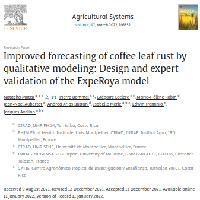Resumen
-
CONTEXT
Coffee leaf rust (CLR) epidemics on Coffea arabica have led to severe socio-economic crises in Latin America starting in 2008. Until now, the scattered nature of scientific and empirical knowledge of the highly complex CLR-coffee pathosystem has been an obstacle to the development of CLR forecasting models.OBJECTIVE
To help prevent new severe epidemics, we built ExpeRoya, a qualitative model, based on a review of the scientific literature and expert opinion, to forecast the risk of a monthly increase in the incidence of CLR at plot and landscape levels.METHODS
We adopted the IPSIM (Injury Profile SIMulator) framework, a qualitative and aggregative modeling approach that describes the effects of the cropping system and the plot environment on injuries, thereby making it possible to incorporate scattered knowledge on the system and all its complexity in a simplified way. Involving experts makes this approach powerful and robust because it builds on empirical knowledge based on a very large number of field observations. We argue that broad expert knowledge provides more accurate information on the manifold interactions in the system than existing quantitative models can. The structure of ExpeRoya was discussed with coffee sector experts in 19 workshops and validated in an online survey with 17 CLR experts.RESULTS AND CONCLUSIONS
ExpeRoya successfully integrates in a simple way 229 multiple interactions that exist within the CLR-coffee pathosystem based on only 12 input variables easily acquired in the field: one incidence monitoring variable; two meteorological variables (temperature and rainfall), four crop management variables (management of shade cover, fungicide application, nutrition and pruning of coffee trees) and five coffee tree characteristics (dates of flowering, beginning and end of harvest, fruit load and cultivar genetic resistance). Coffee institutes in Honduras and Nicaragua now use ExpeRoya, hosted by the platform Pergamino (https://www.redpergamino.net/app-experoya), to assist them in preparing their monthly CLR warning bulletins for growers. ExpeRoya is an improved forecasting model of CLR by fully incorporating the main biophysical factors affecting CLR at the plot and landscape levels.SIGNIFICANCE
ExpeRoya is both a framework and a proof of concept that improves both forecasting and the comprehensive modeling of CLR. ExpeRoya is a powerful yet user-friendly model designed for all actors of the coffee sector, particularly smallholder farmers and extension agents. ExpeRoya is adaptable: users can modify the model according to advances in knowledge and/or their own expertise of the system. ExpeRoya can help prevent future socio-economic crises.
